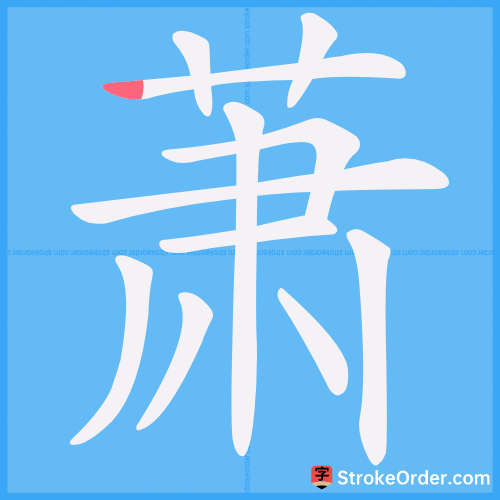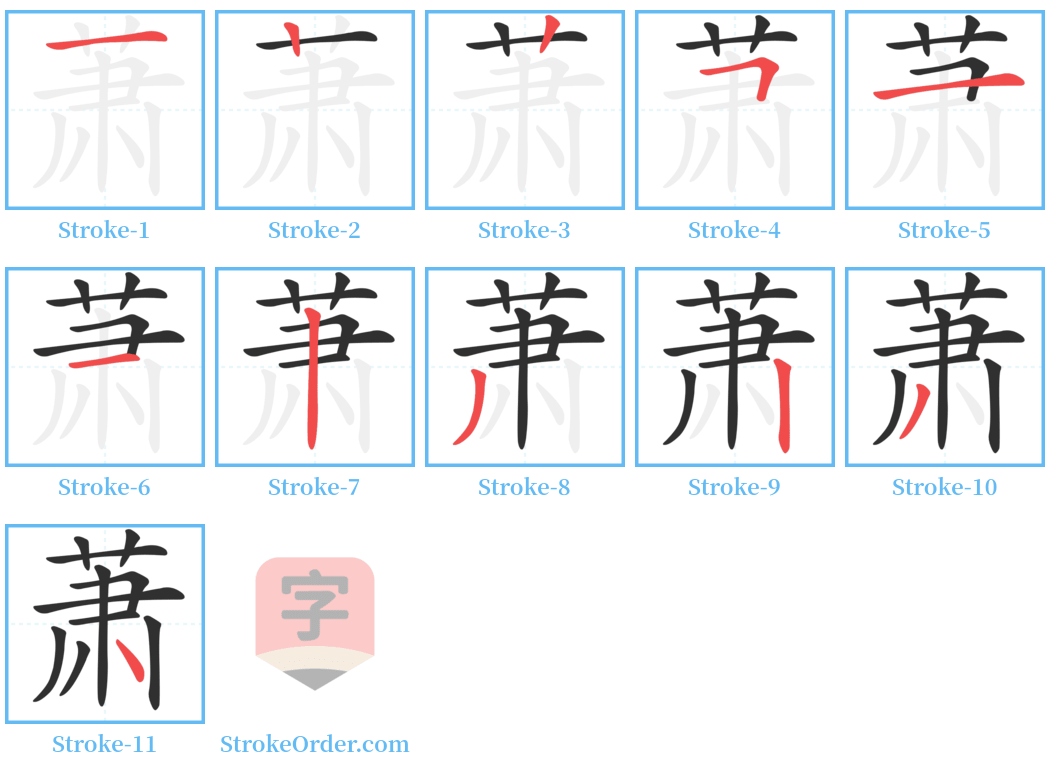萧 Stroke Order
Animated Stroke Order of 萧

Stroke Order Diagrams for 萧

Step-by-Step Handwriting Guide for 萧

Learn to Write Chinese Characters with Video Tutorials
Watch the video of writing the Chinese character "萧", learn the correct stroke order (笔顺) of the character "萧", and master the standard way of writing the character "萧".
Free Printable Handwriting Practice with Stroke Order: 萧
Printable Writing Practice Worksheet of "萧" in Portrait Orientation (Tian Zi Ge)

Printable Writing Practice Worksheet of "萧" in Landscape Orientation (Tian Zi Ge)

Information of 萧
Pinyin
xiāo
Radical
艹
Strokes
11 strokes
Usage
★★★★★
Definition
mournful
萧 – xiāo
Meaning:
1. Refers to "wormwood".
2. Desolate, showing a lack of spirit: 萧然 (slacken), 萧瑟 (sorrowful), 萧索 (desolate), 萧飒 (chilly), 萧森 (gloomy), 萧骚 (silent), 萧疏 (sparse), 萧条 (desolate).
3. 〔象声词〕
① An onomatopoeia describing the sound of a horse neighing or the sound of wind, as in "风萧兮易水寒" (the wind blows, cold as the Yi River).
② Referring to the appearance of hair that is gray and sparse, as in "华发萧老遂良,一身萍挂海中央" (gray hair signifies aging, like a piece of floating weed in the middle of the sea).
4. 〔~墙〕
A reflective wall, metaphorically indicating internal matters, as in "祸起萧墙" (disasters arise from internal strife).
5. A surname, such as 萧统 from the Southern Dynasties Liang.
萧 – xiāo
Meaning:
1. Same as the original meaning: wormwood.
- References:
1. 《说文》: 萧,艾蒿也。(Wormwood is referred to as 萧).
2. 《尔雅》: 萧萩. Note: "即蒿." (It is indeed wormwood).
3. 《周礼·甸师》: 共萧茅.
4. 《诗·王风·采葛》: 彼采萧兮.
- Examples:
- 萧艾 (the name of a foul-smelling plant, metaphorically meaning unworthy or mediocre);
- 萧敷艾荣 (metaphorically indicating compromise and humility leading to success).
2. Ancient state name: Xiao state, a vassal of Song during the Spring and Autumn period, destroyed by Chu. Its territory is in the northwest of present-day Xiao County, Anhui Province.
3. County name: Xiao County, located at the northernmost part of Anhui Province, bordering Jiangsu Province to the east and Henan Province to the west. Established as a county during the Qin dynasty.
4. Surname.
萧 – xiāo
Meaning:
1. Desolate, dreary; abandoned.
- References:
1. 晋· 陶潜《自祭文》: 天寒夜长,风气萧索,鸿雁于征,草木黄落.
2. 晋· 刘伶《北芒客舍》: 蚊蚋归丰草,枯叶散萧林.
3. 宋· 范仲淹《岳阳楼记》: 满目萧然.
4. 清· 张廷玉《明史》: 屋舍萧然.
- Examples:
- 萧屑 (lonely and desolate);
- 萧梢 (the scene where vegetation withers and becomes desolate).
2. Sparse.
- References:
1. 元· 张可久《折桂令·读史有感》: 说到知音,自古无多,白发萧疏,青灯寂寞,老子婆娑.
- Examples:
- 萧然; 萧瑟.
3. Referring to the appearance of dense vegetation.
- Examples:
- 萧森 (appearance of dense vegetation);
- 萧蔘 (lush and abundant vegetation);
- 萧椮 (appearance of flourishing vegetation).
4. An expression for "肃" (sù), indicating respectfulness; solemn.
- References:
1. 《论语·季氏》: 吾恐季孙之忧,不在 颛臾而在萧墙之内也.
2. 《后汉书·傅蘷传》: 此皆衅发萧墙而祸延四海者也.
5. Free and easy.
- References:
1. 唐· 顾况《山居即事》: 下泊降茅仙,萧闲隐洞天.
- Examples:
- 萧闲 (casual and leisurely);
- 萧放 (uninhibited and free);
- 萧远 (carefree and distant).
Input Method for 萧
Pinyin
xiao1
Wubi
avij|avhw
Cangjie
tlll
Zhengma
exno
Four Corner
44227
Unicode
U+8427
Same Pronunciation Characters